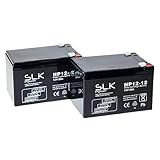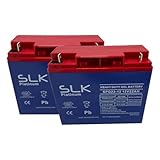Quick Answers
Battery Types: Choose between Sealed Lead Acid (SLA) and Lithium-Ion batteries based on factors like cost, weight, and maintenance preferences.
Consideration Factors: Factors to consider include battery capacity, voltage, cycle life, charging time, weight, maintenance, cost, compatibility, and warranty.
Maintenance Tips: Ensure optimal battery performance by charging regularly, avoiding overcharging or deep discharging, storing in a cool place, checking for damage, and following manufacturer guidelines.
Mobility scooters provide those who have problems walking more freedom to go about. Maintaining the functionality of your mobility scooter depends on having high-quality batteries. Finding the correct batteries for your mobility scooter is covered in detail here.
Top Mobility Scooter Batteries
Types of Mobility Scooter Batteries:
Sealed Lead Acid (SLA) Batteries:
- SLA batteries are the most common type used in mobility scooters.
- They are affordable and widely available.
- Available in two subtypes: AGM (Absorbent Glass Mat) and Gel.
- AGM batteries are maintenance-free, while Gel batteries are more resilient and designed for deep cycling.
Lithium-Ion Batteries:
- Lithium-ion batteries are lightweight and offer longer life and more power.
- They have a higher upfront cost but may be more cost-effective over time due to their longevity and energy efficiency.
- Lithium batteries are maintenance-free and don’t require regular topping up with distilled water.
- PLEASE CHECK COMPATIBILITY AND SIZE BEFORE ORDERING. This listing is for a set of 2 batteries. Due to the nature of the product we are not able to ship to Northern Ireland
- AGM BATTERY: AGM type batteries provide a higher discharge rate, meaning more power for a shorter duration. AGM batteries are great when making regular journeys, using good surfaces, and travelling on relatively flat terrain. Our SLK rechargeable batteries 12ah measure (L)151mm x (W)98mm x (H)98mm and are compatible with a range of scooter and wheelchairs
- QUALITY: SLK Power Mobility Scooter Batteries are known for supreme quality and reliability, providing industry leading performance and long life, widely used by mobility scooter manufacturers
- COMPATIBILITY: For guidance on compatible devices please see description. Our batteries are mostly used for mobility scooters and wheelchairs, however depending on the type, they can also be used for alarms and security system, golf trolley carts, emergency lighting, aviation Industry and more. Please check your manufacturer’s recommendations before ordering
- ABOUT US: We are SLK Mobility, a family owned company with over 15 years of experience. We have been successfully selling batteries for over 10 years, providing quality products and services in the mobility products market. Our aim is to provide top quality mobility scooter wheelchair batteries and chargers at an affordable prices
- Superior High Performance Battery Reliable and safe performance
- Pair of 12v 22AH Mobility Scooter Batteries
- 2 Batteries Supplied
- Battery Dimension : Length = 181mm, Width = 76mm, Height = 163mm
- 12 volts 22AH Gel batteries – (Pair Supplied)
- PLEASE CHECK COMPATIBILITY AND SIZE BEFORE ORDERING. This listing is for 2 batteries
- AGM BATTERY: AGM type batteries provide a higher discharge rate, meaning more power for a shorter duration. AGM batteries are great when making regular journeys, using good surfaces, and travelling on relatively flat terrain. Our SLK rechargeable batteries 40ah measure (L)198mm x (W)166mm x (H)170mm and are compatible with a range of scooter and wheelchairs
- QUALITY: SLK Power Mobility Scooter Batteries are known for supreme quality and reliability, providing industry leading performance and long life, widely used by mobility scooter manufacturers
- COMPATIBILITY: For guidance on compatible devices please see description. Our batteries are mostly used for mobility scooters and wheelchairs, however depending on the type, they can also be used for alarms and security system, golf trolley carts, emergency lighting, aviation Industry and more. Please check your manufacturer’s recommendations before ordering
- ABOUT US: We are SLK Mobility, a family owned company with over 15 years of experience. We have been successfully selling batteries for over 10 years, providing quality products and services in the mobility products market. Our aim is to provide top quality mobility scooter wheelchair batteries and chargers at an affordable prices
- 24 Volt 10 amp Power
- Weighs just 4 lbs
- Lithium Ion
- Approved for Travel on Airlines
- MOBILITY SCOOTER BATTERIES – 12 MONTH WARRANTY
Factors to Consider When Choosing Mobility Scooter Batteries:
Battery Type:
- Consider your specific needs and budget when choosing between SLA and lithium-ion batteries. Lithium-ion batteries offer weight, lifespan, and energy efficiency advantages.
Battery Capacity (Ah):
- Battery capacity determines how far you can travel on a single charge. Ensure the battery capacity meets your daily requirements.
Voltage (V):
- Most mobility scooters use 12V batteries. Ensure you select the correct voltage for your scooter’s configuration.
Cycle Life:
- Lithium-ion batteries generally have a longer cycle life than SLA batteries. Consider how often you plan to use the scooter and how frequently you’ll recharge the batteries.
Charging Time:
- Lithium-ion batteries typically have shorter charging times compared to SLA batteries. If convenience is a priority, this could be a deciding factor.
Weight:
- Lithium-ion batteries are considerably lighter than SLA batteries, making them ideal for portable scooters and users who may need to lift them.
Maintenance:
- SLA batteries require periodic maintenance, including topping up with distilled water, whereas lithium-ion batteries are maintenance-free.
Cost:
- Consider your budget for both the initial purchase and long-term maintenance. While lithium-ion batteries have a higher upfront cost, they may be more cost-effective over their extended lifespan.
Compatibility:
- Ensure the batteries you choose are compatible with your specific mobility scooter model. Consult your scooter’s manual or manufacturer for guidance.
Warranty:
- Check the warranty offered with the batteries. High-quality batteries often come with more extended warranties, providing peace of mind.
Tips for Battery Care and Maintenance:
- Charge the batteries regularly, ideally after each use, to maintain longevity.
- Avoid overcharging or deep discharging, as this can damage the batteries.
- Store the batteries in a cool, dry place when not in use.
- Check the batteries for signs of damage, leaks, or corrosion, and replace them if necessary.
- Follow the manufacturer’s guidelines for maintenance and care.
Conclusion:
Selecting the best mobility scooter batteries involves considering factors such as battery type, capacity, cycle life, and cost. Your choice should align with your needs, budget, and usage patterns. Regular maintenance and proper care of the batteries will ensure they perform optimally, providing reliable and efficient power for your mobility scooter and, ultimately, greater independence and mobility.









